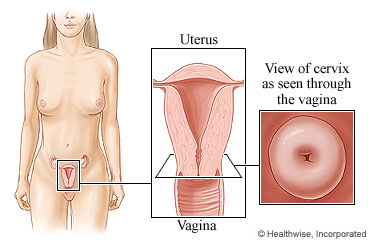Loop Electrosurgical Excision Procedure (LEEP): Before Your Procedure

What is LEEP?
A loop electrosurgical excision procedure (LEEP) is a procedure used to treat or diagnose abnormal cells on the cervix. It takes only a few minutes and usually happens in a clinic or hospital. You may have this done if you've had a Pap test that shows tissue that isn't normal.
During LEEP, your doctor will put a tool called a speculum into your vagina. It opens the vagina a little bit. This lets your doctor see the cervix and inside the vagina. A special vinegar and iodine solution is put on your cervix to make certain areas easier to see.
You will get freezing medicine to numb the cervix. You may feel a cramp, feel shaky, have a funny taste in your mouth, or have a faster heartbeat for a few minutes.
LEEP is done in a clinic or a hospital. It takes only a few minutes.
You should be able to go back to your normal routine the following day.
Follow-up care is a key part of your treatment and safety. Be sure to make and go to all appointments, and call your doctor or nurse advice line (811 in most provinces and territories) if you are having problems. It's also a good idea to know your test results and keep a list of the medicines you take.
How do you prepare for the procedure?
Procedures can be stressful. This information will help you understand what you can expect. And it will help you safely prepare for your procedure.
 Preparing for the procedure
Preparing for the procedure
- Tell your doctor if:
- You are having your menstrual period.
- You are or might be pregnant, because if you are, your procedure may need to be rescheduled. A blood or urine test may be done to see if you are pregnant.
- Understand exactly what procedure is planned, along with the risks, benefits, and other options.
- If you take a medicine that prevents blood clots, your doctor may tell you to stop taking it before your procedure. Or your doctor may tell you to keep taking it. (These medicines include aspirin and other blood thinners.) Make sure that you understand exactly what your doctor wants you to do.
- Tell your doctor ALL the medicines and natural health products you take. Some may increase the risk of problems during your procedure. Your doctor will tell you if you should stop taking any of them before the procedure and how soon to do it.
What happens on the day of the procedure?
- You may eat or drink as you normally do if you are coming to a clinic for your procedure. (You will be advised if you are going to have the procedure in an operating room in the hospital.)
- You may want to take a pain reliever (such as Advil, Tylenol or Motrin) 30 to 60 minutes before you have the procedure. This can help reduce discomfort.
- If you have the procedure in the hospital, you may be advised to take off all jewellery and piercings. And take out contact lenses, if you wear them. You do not need to do this if you are coming to a clinic for the procedure.
At the clinic or hospital
- Bring a picture ID and your Alberta Health card.
- The procedure will take about 10 minutes.
- You can go home right after the procedure if you have arranged for someone to drive you home. If you have not, you may be asked to wait in the clinic for an extra 30 minutes before you go home.
When should you call your doctor?
You should call the clinic when:
- You have questions or concerns.
- You don't understand how to prepare for your procedure.
- You become ill before the procedure (such as fever, flu, or a cold).
- You need to reschedule.
Where can you learn more?
Go to https://www.healthwise.net/patientEd
Enter L547 in the search box to learn more about "Loop Electrosurgical Excision Procedure (LEEP): Before Your Procedure".
Adaptation Date: 7/17/2023
Adapted By: Alberta Health Services
Adaptation Reviewed By: Alberta Health Services
